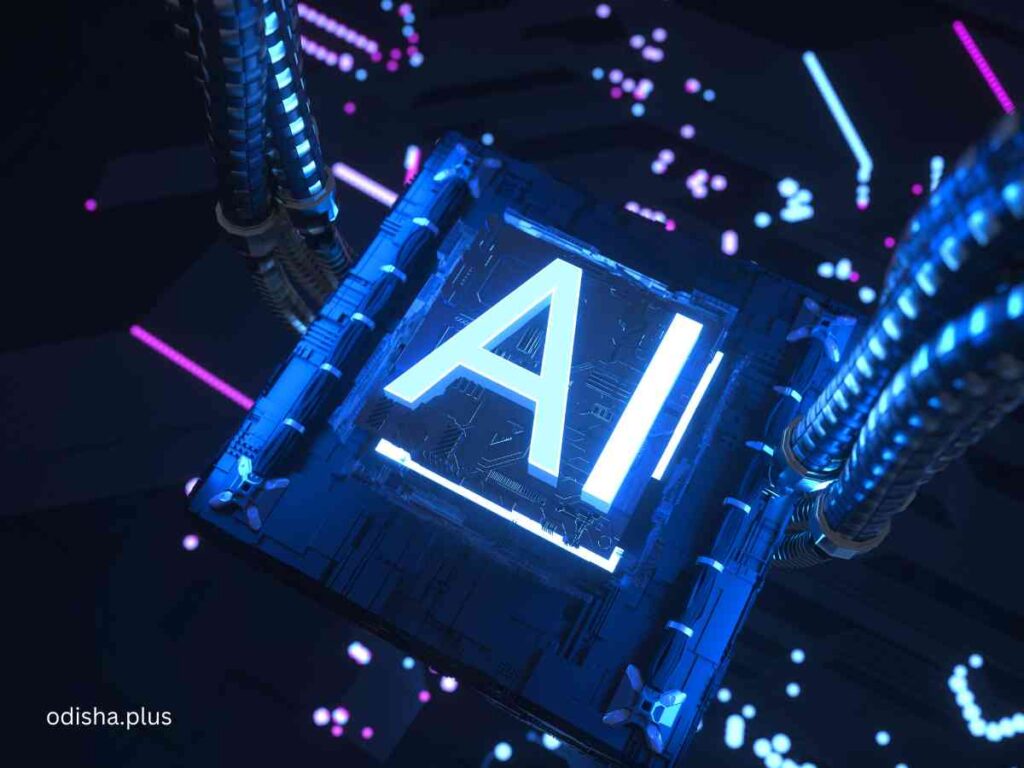By leveraging AI, the government can scale its e-governance initiatives and improve performance across geographies, ultimately benefiting citizens and driving development
OdishaPlus Knowledge Series

Artificial Intelligence (AI) is poised to revolutionize governance, bringing unprecedented changes to policy-making and public service delivery. As AI continues to innovate, it promises to disrupt traditional methods and enhance the efficiency, transparency, and responsiveness of government operations.
Empowering Policy and Governance
AI can significantly empower the governance sector by providing data-driven insights for policy formulation.
Predictive analytics can help anticipate societal needs and challenges, enabling proactive measures. AI-driven tools can streamline administrative processes, reducing bureaucratic delays and improving service delivery.
For instance, AI can automate routine tasks, allowing government employees to focus on more complex issues.
Leveraging AI for Better Governance
Governments can leverage AI to enhance e-governance initiatives, making public services more accessible and efficient. In India, AI can be used to improve the implementation of welfare schemes, ensuring that benefits reach the intended recipients.
AI-powered chatbots can provide citizens with real-time information and assistance, improving public engagement and satisfaction.
Transforming Public Service Delivery
AI can transform public service delivery by enhancing the reach and impact of government programs. For example, AI can analyze large datasets to identify trends and optimize resource allocation, ensuring that programs are more effective and efficient. This can lead to better outcomes for beneficiaries and the general public.
Immediate Impact on Governance
The immediate impact of AI on governance includes improved decision-making, faster service delivery, and increased transparency. AI can help detect and prevent fraud, ensuring that public funds are used appropriately.
By embracing AI, governments can build a more responsive and accountable public service.
Challenges and Solutions
AI has the potential to transform governance in India and beyond. By addressing challenges and leveraging AI’s capabilities, governments can enhance their operations, improve public services, and ultimately benefit society as a whole.
However, AI also poses challenges such as data privacy concerns, the need for robust cybersecurity measures, and the potential for job displacement. To address these challenges, governments must invest in AI literacy and training for officials at all levels. This includes administrators, officers, and grassroots staff, ensuring they understand and can effectively use AI tools.
Ethical Concerns in AI Governance
AI in governance raises several ethical concerns that need careful consideration:
Bias and Discrimination: AI systems can inadvertently perpetuate or even amplify existing biases present in the data they are trained on. This can lead to discriminatory outcomes, particularly in areas like law enforcement, hiring, and social services.
Privacy: The use of AI often involves processing large amounts of personal data, raising significant privacy concerns. Ensuring that data is collected, stored, and used responsibly is crucial to protect individuals’ privacy rights.
Transparency and Accountability: AI decision-making processes can be opaque, making it difficult to understand how decisions are made. This lack of transparency can undermine trust in AI systems and make it challenging to hold them accountable for their actions.
Surveillance: The deployment of AI in surveillance systems can lead to increased monitoring of individuals, potentially infringing on civil liberties and leading to a surveillance state.
Job Displacement: The automation of tasks through AI can lead to job displacement, particularly in sectors where routine tasks are prevalent. This raises concerns about the economic impact on workers and the need for retraining and reskilling programs.
Ethical Use of Data: Ensuring that data used by AI systems is ethically sourced and used is critical. This includes obtaining proper consent from individuals and ensuring that data is not used for harmful purposes.
To address these concerns, governments and organizations need to establish robust AI governance frameworks that emphasize fairness, accountability, transparency, and inclusivity. Training and educating officials and employees on ethical AI practices is also essential to ensure that AI is used responsibly and for the greater good.
Scaling E-Governance Initiatives
AI has the potential to significantly enhance e-governance initiatives and improve government performance across India.
Here are some ways AI can be utilized:
Automated Public Services: AI can automate routine tasks such as processing applications, issuing certificates, and responding to citizen queries. This reduces the workload on government employees and speeds up service delivery.
Predictive Analytics: AI can analyze large datasets to predict trends and needs. For example, it can forecast demand for public services, helping governments allocate resources more efficiently.
Smart Cities: AI can be integrated into smart city initiatives to manage urban infrastructure more effectively. This includes traffic management, waste management, and energy distribution, improving the quality of life for residents.
Improving Government Performance
Data-Driven Decision Making: AI can provide insights from vast amounts of data, enabling more informed policy decisions. This helps in crafting policies that are more effective and targeted.
Enhanced Transparency: AI can monitor government transactions and activities, ensuring transparency and reducing corruption. For instance, AI can track the distribution of welfare benefits to ensure they reach the intended recipients.
Citizen Engagement: AI-powered chatbots and virtual assistants can provide citizens with real-time information and assistance, improving engagement and satisfaction. These tools can handle a large volume of queries, providing consistent and accurate responses.
Addressing Challenges
Training and Capacity Building: Government officials and employees need to be trained in AI technologies. This includes understanding how to use AI tools and interpreting AI-generated insights.
Ethical Considerations: Ensuring the ethical use of AI is crucial. This involves addressing issues like data privacy, bias, and accountability. Governments must establish clear guidelines and frameworks for the ethical use of AI.
Infrastructure Development: Building robust digital infrastructure is essential for the effective implementation of AI. This includes high-speed internet, data centers, and secure communication networks.
Immediate Impact
Efficiency Gains: AI can streamline government processes, reducing delays and improving efficiency. This leads to faster service delivery and better utilization of resources.
Improved Public Services: AI can enhance the quality and accessibility of public services, making them more responsive to citizen needs. This can lead to higher satisfaction and trust in government.
Informed Policymaking: With AI-driven insights, policymakers can make more informed decisions, leading to better outcomes for society.
By leveraging AI, the Indian government can scale its e-governance initiatives and improve performance across geographies, ultimately benefiting citizens and driving development.
(This article is curated with the support of AI tools.)


























Thank you for this comprehensive and engaging post. Your clear and concise writing style makes it easy to follow along, even with more complex topics. I learned a lot from this article and will definitely be referring back to it in the future. Keep up the great work!